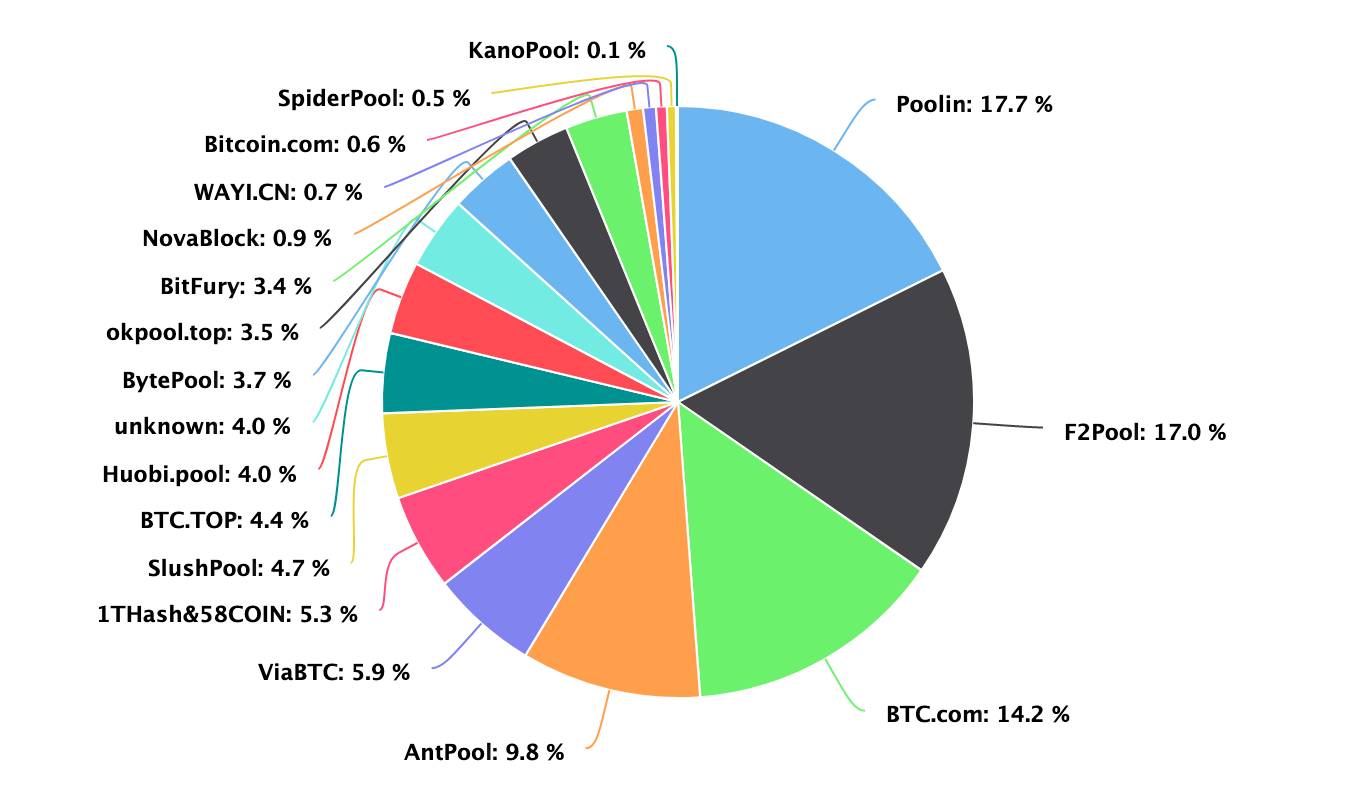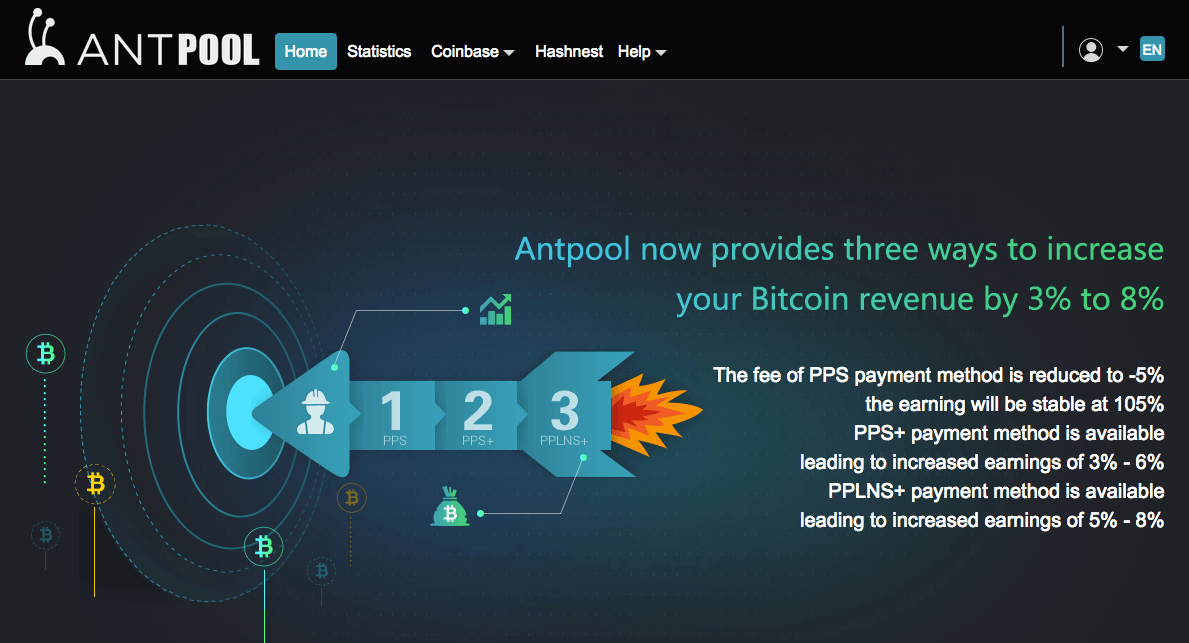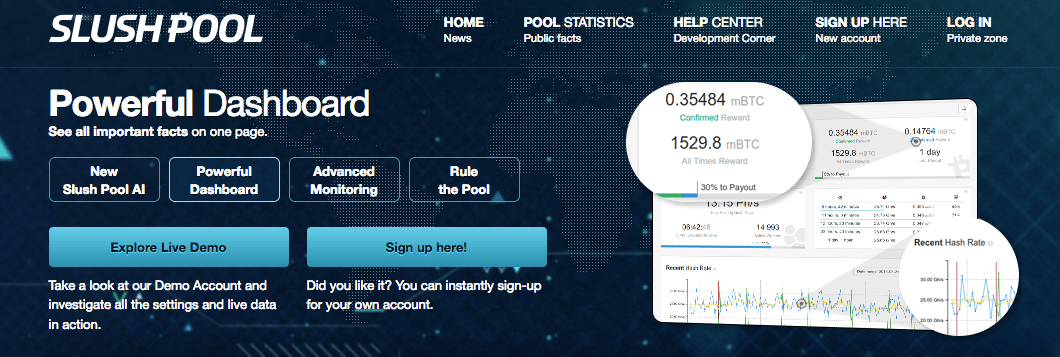Bitcoin Mining Pools

 Now that you have Bitcoin mining hardware, your next step is to join a Bitcoin mining pool.
Now that you have Bitcoin mining hardware, your next step is to join a Bitcoin mining pool.What is a Mining Pool?
Mining pools are groups of cooperating miners who agree to share block rewards in proportion to their contributed mining hash power.
While mining pools are desirable to the average miner as they smooth out rewards and make them more predictable, they unfortunately concentrate power to the mining pool’s owner.
Miners can, however, choose to redirect their hashing power to a different mining pool at anytime.
Pool Concentration in China
Before we get into the best mining pools to join, it’s important to note that most mining pools are in China. Many only have Chinese websites and support. Mining centralization in China is one of Bitcoin’s biggest issues at the moment.
There are about 20 major mining pools. Broken down by the percent of hash power controlled by a pool, and the location of that pool’s company, we estimate that Chinese pools control ~81% of the network hash rate:
China - 81%
Czech Republic - 10%
Iceland - 2%
Japan - 2%
Georgia - 2%
Russia - 1%
The Biggest Mining Pools
The list below details the biggest Bitcoin mining pools. This is based on info from Blockchain’s pool share chart:

We strongly recommend new miners to join Slush Pool despite it not being one of the biggest pools. It was the first Bitcoin mining pool and remains one of the most reliable and trusted pools, especially for beginners.
1. BTC.com
BTC.com is a public mining pool that can be joined and mines 15% of all block. We strongly recommend joining Slush Pool instead.
2. Antpool
Antpool is a mining pool based in China and owned by BitMain. Antpool mines about 11% of all blocks.
3. Slush
Slush was the first mining pool and currently mines about 11% of all blocks.
Slush is probably one of the best and most popular mining pools despite not being one of the largest.
4. F2pool
F2Pool is based in China. It has mined about 10% of all blocks over the past six months.
5. ViaBTC
ViaBTC is a somewhat new mining pool that has been around for about one year. It’s targeted towards Chinese miners and mines about 9% of all blocks.
6. BTC.top
BTC.top is a private pool and cannot be joined. It mines about 7% of all blocks.
7. DPOOL
DPOOL is a Chinese pool and mines about 4% of all blocks.
8. Bitclub.Network
Bitclub Network is a large mining pool but appears to be somewhat shady. We recommend staying away from this pool.
9. Bitfury
Bitfury is a private pool that cannot be joined. Bitfury currently mines about 3.5% of all blocks.
10. 58COIN
58COIN is a Chinese Bitcoin mining pool.
Bitcoin Mining Pool Comparison
| Pool | Location | Fees | Private Pool |
|---|---|---|---|
| BitFury | Georgia | 0% | Yes |
| BTCC | China | 2-3% | No |
| Slush Pool | Czech Republic | 2% | No |
| Antpool | China | 1% | No |
| BW | China | 1% | No |
The comparison chart above is just a quick reference. The location of a pool does not matter all that much. Most of the pools have servers in every country so even if the mining pool is based in China, you could connect to a server in the US, for example.
Get a Bitcoin Wallet and Mining Software
Before you join a mining pool you will also need Bitcoin mining software and a Bitcoin wallet.
Mining Pools vs Cloud Mining
Many people read about mining pools and think it is just a group that pays out free bitcoins. This is not true! Mining pools are for people who have mining hardware to split profits.
Many people get mining pools confused with cloud mining. Cloud mining is where you pay a service provider to miner for you and you get the rewards.
JUST WANT BITCOINS?
If you just want bitcoins, mining is NOT the best way to obtain coins.
Buying bitcoins is the EASIEST and FASTEST way to purchase bitcoins.
Get $10 worth of free bitcoins when you buy $100 or more at Coinbase.
Which Countries Mine the most Bitcoins?
Bitcoin mining tends to gravitate towards countries with cheap electricity.
As Bitcoin mining is somewhat centralized, 10-15 mining companies have claimed the vast majority of network hash power.
With many of these companies in the same country, only a number of countries mine and export a significant amount of bitcoins.
China
China mines the most bitcoins and therefore ends up “exporting” the most bitcoins.
Electricity in China is very cheap and has allowed Chinese Bitcoin miners to gain a very large percentage of Bitcoin’s hash power.
It’s rumored that some Chinese power companies point their excess energy towards Bitcoin mining facilities so that no energy goes to waste.
China is home to many of the top Bitcoin mining companies:
It’s estimated that these mining pools own somewhere around 60% of Bitcoins hash power, meaning they mine about 60% of all new bitcoins.
Georgia
Georgia is home to BitFury, one of the largest producers of Bitcoin mining hardware and chips. BitFury currently mines about 15% of all bitcoins.
US
The US is home to 21 Inc., a Bitcoin mining company based in California.
21 runs a large amount of miners, but also sells low powered bitcoin miners as part of their 21 Bitcoin computer.
Most of the hash power from the 21 Bitcoin computers is pointed towards 21’s mining pool. 21 Inc. mines about 3% of all bitcoins.
Other Countries
The countries above mine about 80% of all bitcoins.
The rest of the hash power is spread across the rest of the world, often pointed at smaller mining pools like Slush (Czech Republic) and Eligius (US).
While we can see which mining pools are the largest, it’s important to understand that the hash power pointed towards a mining pool isn’t necessarily owned by the mining pool itself.A Note on Pools
There are a few cases, like with BitFury and KnCMiner, where the company itself runs the mining operation but doesn’t run a mining pool.
Bitcoin miners can switch mining pools easily by routing their hash power to a different pool, so the market share of pools is constantly changing.
To make the list of top 10 miners, we looked at blocks found over the past 6 months using data from BlockTrail.
The size of mining pools is constantly changing. We will do our best to keep this posted up-to-date.
Note:
If you cloud mine then you don’t need to select a pool; the cloud miningcompany does this automatically.
Why are Miners Important?
Bitcoin miners are crucial to Bitcoin and its security. Without miners, Bitcoin would be vulnerable and easy to attack.
Get this:
Most Bitcoin users don’t mine.
However, miners are responsible for the creation of all new bitcoins and a fascinating part of the Bitcoin ecosystem.
Mining, once done on the average home computer, is now mostly done in large, specialized warehouses with massive amounts of mining hardware.
These warehouses usually direct their hashing power towards mining pools.
Antpool Review
Despite recent controversy, Antpool remains the largest Bitcoin mining pool in terms of its Bitcoin network hash rate. Antpool holds roughly 15% of the total hash rate of all Bitcoin mining pools.

About Antpool
Antpool mined its first block in March 2014, meaning that it emerged roughly four years after the first mining pool; Slushpool.
Antpool is run by Bitmain Technologies Ltd., the world’s largest Bitcoin mining hardware manufacturer, and a large portion of their pool is run on Bitmain’s own mining rigs.
Antpool supports p2pool and stratum mining modes with nodes that are spread all over the world to ensure stability (US, Germany, China etc.).
Also, Antpool’s user interface is surprisingly slick considering that the underlying company thrives mostly off of hardware sales.
How to Join Antpool
The pool is free to join and the process is simple.
First, you need to acquire Bitcoin mining hardware. Then you need to download mining software. If you need help deciding, I suggest you take a look at our hardware and software guides.
Hardware is important because it determines the size of your contribution to the pool’s hash rate. Software is important because it enables you to direct your hardware’s hash power towards the pool you prefer. So make sure to make the right choice in order to optimize your rewards.
Finally, sign up at antpool.com to get started.
What are Antpool’s Fees?
Antpool claims that it does not charge any fees for using its pool. Although there is some truth to this claim, it is not 100% correct.
While Antpool does not directly charge fees, it also does not disclose the Bitcoin transaction fees that are collected. Basically, clients are left in the dark. Currently, every Bitcoin block has a 12.5 BTC reward which Antpool does share with you when it finds a block.
Lately, however, Bitcoin transaction fees have been rising and an additional 1-2 bitcoins are collected per block by pools. At this time, Antpool keeps 1-2 bitcoins form transaction fees for itself, which are not shared with miners who have hash power pointed toward the pool.
It can be argued that these rates prevent the service from being usable for small-time and big-volume users. Consequently, some users on bitcointalk.orgheed that the undisclosed fees make the service unwise to use for the time being.
What is the Payout Threshold?
The pool does not appear to have a payout threshold and pays out every day around 10 AM UTC.
The minimum withdrawal amount is 0.0005 BTC (other sources say 0.001 BTC).
Can you do Solo Mining on Antpool?
Solo mining means you mine for bitcoins without joining a pool. So if you use Antpool you are not solo mining by default.
Generally, you will receive more frequent payouts by joining a pool.
What is the Controversy around Antpool?
Antpool has refused to enable arguably beneficial upgrades to Bitcoin for reasons based on claims that have been largely disproved. Notably, this has taken place with somewhat of a vindictive attitude.
More specifically, the controversy revolves around Segwit – a feature that requires miner activation to be enabled. Despite the fact that most Bitcoin users want this feature activated, Antpool, among other pools, appears to be blocking this feature.
Antpool began signaling for Bitcoin Unlimited in early March 2017 for reasons that have not been elucidated by Bitmain CEO (and cofounder Jihan Wu).
Antpool claims that it will only signal for Segwit if there is a hardfork, which is a proposition that most users oppose. Furthermore, allegations that the owner refuses to sell hardware to Segwit supporters have also begun to circulate.
By using Antpool, you allow the pool to decide your hardware’s approach to these matters, meaning that the pool that you used dictates the type of Bitcoin protocol that your hardware employs. If you wish to decide which implementation your hardware should signal for, you can use a pool that leaves the choice to its users, like the Slush mining pool.
Bitfury Information
According to BlockTrail, Bitfury is the third largest Bitcoin mining pool and mines about 11% of all blocks.
The main difference between the Bitfury pool and other mining pools is that Bitfury is a private pool.
Bitfury, the company, makes its own mining hardware and runs its own pool. So, unlike Slush or Antpool, Bitfury cannot be joined if you run mining hardware at home.
Bitfury 16nm ASIC Chip
Unrelated to its pool, Bitfury sells a 16nm ASIC mining chip.
Although Bitfury controls a large portion of the Bitcoin network hash rate, its committed to making Bitcoin decentralized :
BitFury is fundamentally committed to being a responsible player in the Bitcoin community and we want to work with all integrated partners and resellers to make our unique technology widely available ensuring that the network remains decentralized and we move into the exahash era together.
Valery Vavilov, CEO of BitFury
BTCC Mining Pool Review
BTCC Mining Pool is run by BTCC, a Bitcoin company based in China. The company also runs a Bitcoin exchange, wallet, prints physical bitcoins and more!

Worldwide Servers
BTCC runs servers all over the world so your mining hardware can connect easily to the BTCC pool.
So even though BTCC is based in China, don’t be worried that you can’t use or join the pool:
Our mining pool currently has customers from the United States, South America, Europe, China, and Africa.Bobby Lee, BTCC CEO
Shared Transaction Fees
One great thing about BTCC pool is that it shares Bitcoin transaction fees with its miners.
In every Bitcoin block, around 1-2 BTC worth of transaction fees are also rewarded to the pool.
Some pools keep these fees for themselves and DO NOT share with their miners! BTCC evenly splits the transaction fees among its miners, just like it splits the 12.5 BTC reward.
Slush Pool Review
Slush Pool is run by Satoshi Labs and was the world’s first ever Bitcoin mining pool. It’s advanced yet also a great pool for beginners.

How to Join and Use Slush Pool
Slush Pool is easy to join.
- First, register an account.
- Configure your mining software to point your hardware’s hash power to Slush Pool.
- Enter your Bitcoin wallet address that will receive the payouts.
Here is a helpful video that shows you how to get started:
Slush Mining Pool URLs
According to Slush’s website, there are the current URLs for the mining pool. You will want to point your software towards the URL location closest to you. This will maximize your mining profits.
USA, east coast:
stratum+tcp://us-east.stratum.slushpool.com:3333
Europe
stratum+tcp://eu.stratum.slushpool.com:3333
China, mainland
stratum+tcp://cn.stratum.slushpool.com:3333
stratum+tcp://cn.stratum.slushpool.com:443
stratum+tcp://cn.stratum.slushpool.com:443
Asia-Pacific/Singapore:
stratum+tcp://sg.stratum.slushpool.com:3333
What are Slush Pool’s Fees?
Slush Pool charges 2% of all payouts.
This may seem like a lot but unlike other pools it shares the transaction fees with its miners. At current levels, these amount to 1-2 BTC more per block.
Satoshi Labs
Satoshi Labs runs Slush Pool. They also make the Bitcoin TREZOR hardware wallet and Coinmap.org.
Ethereum Mining Pool
Many people want to use the pools above for Ethereum too. But, most of the pools listed above are only for Bitcoin mining. Please see our post on Ethereum mining pools for more info on ETH specific pools.
Litecoin Mining Pool
Like Ethereum, none of the pools above support litecoin. For LTC mining you will need separate hardware and a separate pool.
Bitcoin Mining Pool Taxes
You’ll have to consult an accountant or lawyer in your area. But most likely you will have to pay income tax on income from mining pools just like you would for any other type of income.

No comments:
Post a Comment